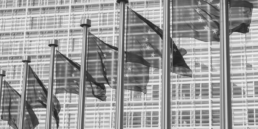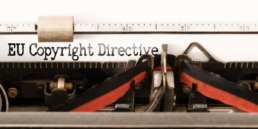The EU Copyright Directive Went Into Effect on June 7, 2021 — Are You Ready?
EU member states were given until June 7, 2021, to transpose the EU Copyright Directive into national legislation. This law affects most online content sharing service providers, including social media platforms, that make available, organize and promote for profit-making purposes copyrighted content uploaded by users. Despite the pandemic slowing the process, several states, including Germany, France, Hungary, and the Netherlands, have completed transposing or adopting the directive into their country’s law. Other countries are not far behind, but the reality is that platforms need to comply on June 7th.
The UK, having left the EU, will not be implementing the directive.
What are the Key Things You Need to Know?
The two main provisions of the directive for platforms include:
- Obtaining licenses for content on their sites
- Preventing the availability of unauthorized content
Other provisions include setting up a user appeals process and preventing reuploads of previously notified content.
Does the Directive Impact All Providers?
The Directive specified that certain platforms were exempt from these obligations. First, non-profits in defined areas such as online encyclopedias and scientific repositories, like Wikipedia and Archive.org, are excluded. Second, small companies will not need to prevent unauthorized content but must still respond to takedown notices and pursue licensing. Courts will apply the principle of proportionality in assessing whether a service provider has complied with its obligations based on the type of service, size, audience, type of works, and availability of suitable and effective measures. Finally, platforms that are not providing access or now chose to block access to those who live in the EU will not have to conform to the directive.
Rightsholders’ Obligations
Rightsholders also have obligations. For example, they must provide relevant and necessary information to enable a platform to identify content that cannot be made available on their site. This is key. If this information is not provided directly or through a vendor such as Audible Magic, the platform’s only obligations are to respond to takedown notices.
We recommend you consult with appropriate legal counsel as you implement provisions to meet the Directive.
How to Move Forward
Audible Magic is here to help service providers with meeting the new legislation by offering services to:
Use our identification services for audio and video to help prevent hosting unauthorized copyrighted content
- Identify unauthorized or authorized copyrighted content.
- Implement stay-down measures for unauthorized copyrighted content.
- Track activity for reporting purposes.
Access and Manage Licenses
Audible Magic offers sub-licenses for music or, where possible, helps facilitate obtaining licenses directly from a rightsholder. In addition, we offer proven services to ingest and clear catalogs and perform royalty reporting and payments.
Learn More about the Copyright Directive
- Take our A17 Assessment Survey
- Read the EU Copyright Directive
- Learn more about the Copyright Directive by visiting our resource page
Are EU Member States Making Progress with Article 17?
With the June 7th, 2021 deadline looming for EU Member States to implement the 2019 EU Copyright Directive, many wonder about the timing of individual country transpositions or if there will be delays. The transposition is a process whereby each member state passes legislation to give force to the directive in that country. Although Covid-19 slowed progress, all major EU countries are making headway in their transposition process and are expected to meet the June deadline. The one significant exception is the UK, no longer part of the EU because of Brexit. The government has said it will not be implementing the directive.
To ensure the benefit of the new safe harbor provisions, online content-sharing services that make copyright works, such as music, publicly available in user-generated content will need to understand how and when the law is transposed by each member state. For example, The Netherlands has completed the transposition of the law and has specified that it will go into effect as of June 7, 2021.
We are watching this process carefully since some countries have considered adopting additional or different implementation measures in their transpositions. This could cause service providers to have a requirement to adjust their plans for each country they stream content to.
To learn more about how Article 17 will impact your business, we have included more resources at the end of this summary.
The Netherlands
The Netherlands became the first EU member state to implement the directive on December 28th. Their implementation is mostly a literal transposition of the directive’s provisions, but it also includes a provision that allows the Ministry of Justice to provide further rules on the application of the Article 17 implementation.
Germany
On February 3rd, Germany’s government approved their latest proposal, which was revised in response to feedback from rightsholders and platforms. This draft states that without a corresponding license, platforms must block uploaded copyrighted content; however, short excerpts are presumed permitted by law and may not be blocked by automatic means. The law is scheduled to be debated in the legislature in March.
Austria
The Austrian Ministry of Justice completed the first proposal in December, which borrows elements from previous German proposals, including a direct remuneration right for creators, users’ ability to pre-flag uploads as legitimate, and a threshold that protects minor uses from automated blocking.
France
France passed an authorization law on November 18th, allowing them to implement provisions of the directive by administrative decree. This law specified that the decree implementing Article 17 must be issued 6 months from its passing, which would be April 18th. France's draft law proposes a literal adaptation of Article 17.
Finland
Finland’s proposal relies on the mandatory use of ACR (Automated Content Recognition) technology by platforms. Rightsholders would be required to review infringing uploads before issuing a blocking request, and users would be able to challenge blocks through an independent alternative dispute resolution mechanism.
Denmark
Denmark announced that it would implement Articles 15 and 17 during the parliamentary year and the rest of the directive after the summer. Like the Netherlands, the Denmark transposition is a literal adaptation of the EU Copyright Directive.
The UK Copyright and Creative Economy Centre, based at the University of Glasgow, maintains possibly the most comprehensive and up-to-date resource on national implementation at https://www.create.ac.uk/cdsm-implementation-resource-page/.
Check back for more updates on Article 17 in the coming months. The following resources will help you understand how Article 17 may impact your business.
- What is Article 17?
- Take our A17 assessment to see how Article 17 affects your business.
- Understand how small social networks are impacted by the copyright directive.
This blog is issued for informational purposes only and is not intended to be construed or used as general legal advice. Please contact the author(s) or your Audible Magic Corporation contact if you have questions regarding the currency of this information.
All information is accurate as of March 8, 2021
Sources
https://www.twobirds.com/en/in-focus/copyright-directive
http://www.xinhuanet.com/english/2021-02/04/c_139719400.htm
How Will Article 17 Impact Small Social Networks Outside the EU?
Article 17 also impacts small social networks outside the EU
Understanding your obligations
With the passing of Article 17 of the EU Copyright Directive in 2019, companies hosting copyrighted audio and video like social networks need to understand how this directive impacts their business. Although enacted in the EU, online content sharing service providers (OCSSPs) located outside of the EU will feel the effects of this legislation. Large and small companies need to understand the requirements. They differ slightly depending on your company. For example, the technical measures are not as demanding for smaller companies.
Are you considered an OCSSP?
OCSSPs are defined as follows by the directive:
“A provider of an information society service of which the main or one of the main purposes is to store and give the public access to a large amount of copyright-protected works or other protected subject-matter uploaded by its users, which it organizes and promotes for profit-making purposes.”
Platforms that are hosting content whether audio or video that includes copyrighted material need to comply.
Define small?
The directive defines small companies as:
- Service available in EU < 3 years, and
- Revenue < €10 million in the last calendar year, and
- <5 million unique monthly users on average over the last calendar year
Article 17’s international reach
Article 17 covers not only OCSSPs located in the EU, but any platforms that can be accessed by users in the EU. In this sense, Article 17 has a similar reach as the General Data Protection Regulation (GDPR) recently implemented in Europe, prompting companies outside of Europe to comply.
The intentions of Article 17
Simply put, the legislation is designed to stimulate a fair and open marketplace for the protection and licensing of copyrighted material between OCSSPs and rightsholders.
The goals of the legislation included: “contribute to the functioning of the internal market, provide for a high level of protection for rightsholders, facilitate the clearance of rights, and create a framework in which the exploitation of works and other protected subject-matter can take place.”
Most platforms will need to put in place measures to prevent unauthorized uses, such as Automatic Content Recognition (ACR) services to manage the compliance, licensing and monetization of user-uploaded audio and video.
All platforms are still required to meet existing law requirements, such as a Notice and Takedown system, along with policies to manage repeat copyright infringement required under US law.
So, what does this mean for small OCSSPs?
Small companies are given time to develop before they are expected to implement more advanced automation features such as ACR, but they will still need to comply with Takedown/Stay Down provisions. Once they grow past the definition of a small OCSSP, companies will need to use ACR services to meet the requirements of the directive.
Disclaimer: The information we provide should not be considered legal advice. While we work to be sure our information is accurate and useful; we recommend you consult an attorney.
Plan Now
It is important to start planning now on how to meet the requirements and understand the impact of the Directive on your business.
Below are some resources to help you understand the Directive and how it may impact your business.
- Take our A17 Assessment Survey for platforms to assess if the Directive affects your company and then assess your readiness to comply
- Learn more about the impact of the EU Copyright Directive on live streaming platforms
- Read the full text of the Directive
- And more is available on our Article 17 page as well as in our blog section



